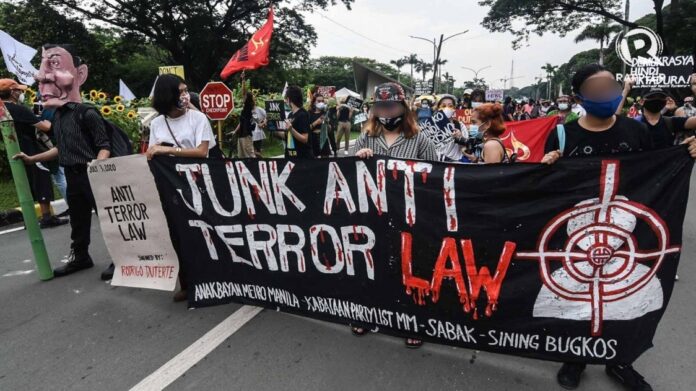The painful terrorist strikes that Tunisia took in 2015 accelerated the ratification of Basic Law No. 26 of 2015 relating to combating terrorism and money laundering.
The approval of this text came after successive delays and long discussions inside and outside parliament, and after more than 5 years of its entry into force, the law is still facing several criticisms.
Human Rights are at Stake
The head of the Tunisian League for the Defense of Human Rights, Jamal Msallam, said in a statement to “JDD”, on Saturday, March 20, 2021, that the equation trying to balance between protecting Tunisia’s internal and external security, resisting extremism and respecting human rights is difficult to achieve.
Msallam added that the 2015 law contains several chapters that do not respect human rights by violating the physical integrity of detainees and the personal data of individuals, and the use of state agencies.
Our interlocutor pointed out that several measures adopted by the state to reduce the threat of terrorism have harmed the freedom and rights of tens of thousands of Tunisians, similar to the S17 border measure without a judicial or legal basis, which confirms the weakness of the legislative text.
He pointed out that the 2015 law included exclusively deterrent and punitive aspects, without addressing the preventive aspect of the crime, stressing that the pattern of terrorist operations has decreased in recent years, but there are still hotbeds for sowing violent extremism because the state has not worked to spread the culture of human rights through its schools and spaces.
A qualitative development in terrorist crimes
From her side, lawyer Inas al-Harrath, known for defending a number of suspects in terrorist cases, confirmed to “JDD” that the aim of the anti-terrorism laws is to reduce or stop the number of attacks, but since the 2015 law enters into force, the general rate of terrorist strikes has not changed as almost every year there is an influential terrorist attack, whether through the large number of victims or the location of its execution, for example, a girl blew herself up in Habib Bourguiba Avenue in the center of the capital.
Professor Harrath added that there is a qualitative development in the identities of the defendants, as their age is getting younger in contrast to the increase in the number of females, indicating that the law has not succeeded in combating the phenomenon due to the spread of terror, hatred, social disruption and the emergence of new individuals and groups wishing to destroy.
Our interlocutor indicated that several chapters in the law are loose and put tens of thousands of people under threat of terrorism, which are illogical numbers in her opinion, stressing that these chapters, especially those related to the glorification and whitewashing of terrorism (Chapter 31) made it easier for society to direct accusations to people with ease and everyone who provides a reading Criticism of the legislation, accused of terrorism, as she puts it.
Amendment proposal
After more than two years of implementing the Terrorism Law, the government deposited in 2019 a proposal to amend it after identifying several breaches. The revision included preventing armament and the spread of weapons of mass destruction, and singling out children in the anti-terrorism pole with special treatment, given that they may be involved in terrorist operations.
After passing the consensus committee, the revision proposal continued to stagnate on the shelves of parliament, although former Justice Minister Ghazi Jeribi had confirmed that the draft revision came within the framework of implementing the state’s pledges to the FATF to review the Tunisian legal system in the field of combating terrorism and money laundering.
During the parliamentary session, the Dignity Coalition bloc presented, on October 9, the proposal for a law number 122/2020 related to the revision of the basic law related to combating terrorism and preventing money laundering. This amendment included the abolition of Chapter 11, which states that “If several terrorist crimes committed for one purpose and are related to each other, the perpetrator shall be punished separately for each one.”
The proposal also provides for the addition of a third paragraph to Chapter 31, ““they shall be deemed to have committed a terrorist crime and shall be punished with the same penalties whoever deliberately praises and glorifies tyranny and dictatorship and insults and disbelieves the martyrs and wounds of the Tunisian revolution. They shall also be deemed to have committed a terrorist crime and shall be punished with the same penalties whoever practices incitement to a coup or rebellion against the institutions of the elected state or calls for its overthrow without legal and constitutional means… ”








